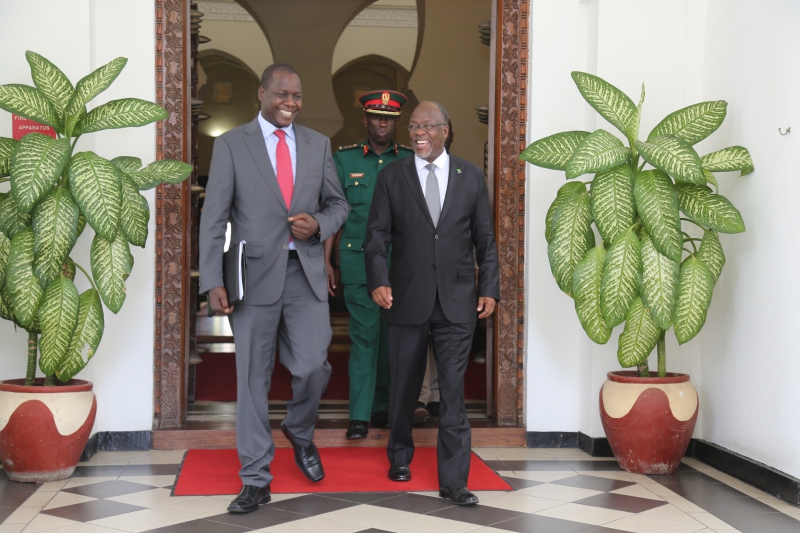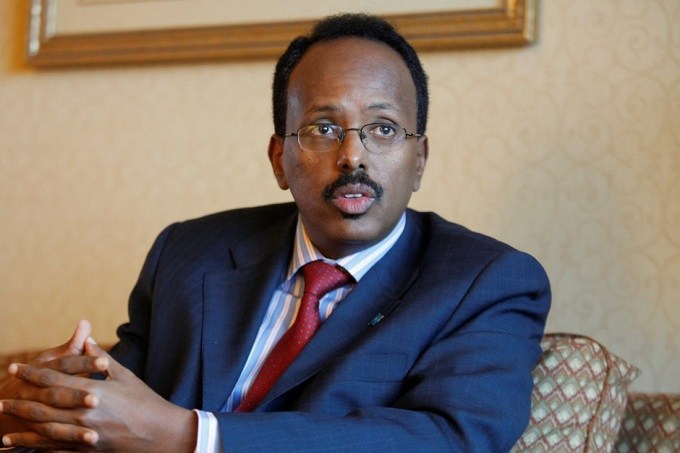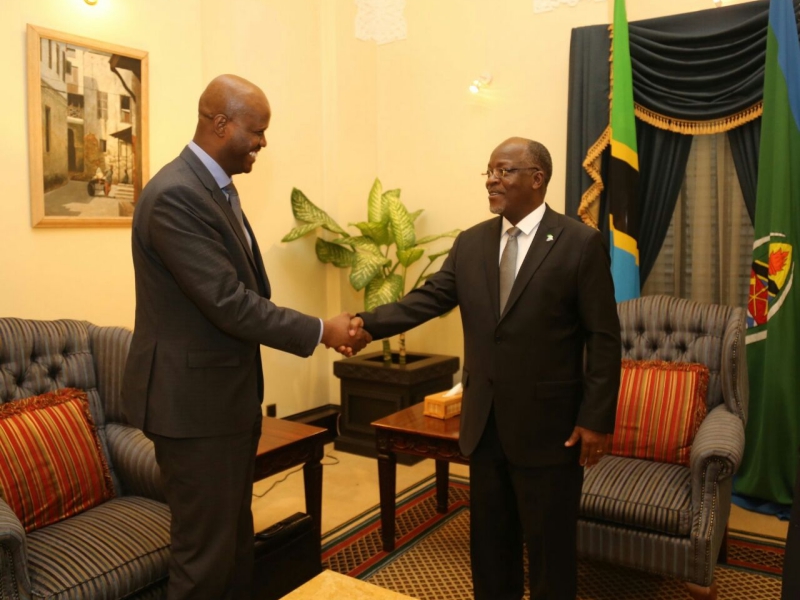
Posted in Press Release
East African Legislative Assembly; Dar es Salaam, Tanzania; 13 February 2017:
President of the United Republic of Tanzania and Chairperson of the EAC Heads of State, H.E. Dr John Pombe Joseph Magufuli has hailed the East African Legislative Assembly (EALA) for its unbounded dedication to the integration process.
President Magufuli who held cordial discussions with the Speaker of EALA, Rt Hon Daniel F. Kidega, in State House, Dar Es Salaam, lauded EALA for its sustained role in strengthening the integration process, noting the tremendous improvement in outputs (Legislation, Oversight and Representation) and optimism when it comes to promoting the integration process.
Central to this aspect the Head of State added, was the Assembly’s rotational principle of holding its Parliamentary Sessions in Partner States, which he said, endeared it (EALA) to many citizens on the one side, while enhancing its public visibility on the other side. The Head of State rooted for the expansion of the bloc saying there was unity and strength in numbers and remarked that one of the fundamental objectives of the bloc was to address imminent challenges facing Partner States.
The President added that the Summit of EAC Heads of State for which he currently chairs, was committed to addressing the existing challenges in all Partner States and specifically in the respective Republics of South Sudan and Burundi.
The Head of State said the situation of food security in the region was not entirely worrying as portrayed in many circles. The President while calling for concerted efforts to address the situation, mentioned of surplus grain reserves in the Republic of Uganda and in the United Republic of Tanzania.
The President further rooted for the signing of the Economic Partnership Agreements (EPAs) as a bloc, while taking into consideration critical factors including industrialization, market access regulation and other global developments.
In his remarks, the Speaker, Rt Hon Daniel F. Kidega, congratulated His Excellency, Dr John Pombe Joseph Magufuli for exemplary leadership saying the United Republic of Tanzania and the EAC at large, had continued to greatly benefit.
“I congratulate you for initiating the reform agenda in this great republic which can be replicated elsewhere across the region,” he said. The Speaker termed peace and security as key components in ensuring progress and development in the region.
The Speaker further informed the President of heightened need for timely remittances of funds by the Partner States noting the Community (all Organs and Institutions) was choking in the absence of the same, and its activities and work plans hampered a great deal.
The Speaker updated President Magufuli of the progress at the Assembly as it begins the wind-down of its tenure (tenure of 3rd Assembly ends in June 2017). Salient achievements, Rt Kidega noted include, the passage of 27 Bills, many of which are undergoing assent by the EAC Heads of State, debate and approval of over 80 Reports and passage of 65 Resolutions.
One of the key deliverables, Rt Hon Kidega remarked, was a Resolution of the House promoting the use of Kiswahili and a plea for its recognition as one of the Official languages of the Community.
“We appeal to the Summit of EAC Heads of State to consider amending the EAC Treaty to make it realizable, unite East Africans and to strengthen integration”, Speaker Kidega added.
The Speaker of the Assembly often briefs the Heads of State of progress at the Legislature and the Community. The Heads of State also regularly address the Assembly at its Sittings in the Partner States in line with Article 54 of the Treaty for the EAC.
Meanwhile, H.E. President Dr John Pombe Joseph Magufuli also met with the Secretary General of the EAC, Hon Amb Liberat Mfumukeko.
- ENDS -
For more information, please contact:
Mr Bobi Odiko
Senior Public Relations Officer
East African Legislative Assembly
Arusha, Tanzania
Tel: +255-27-2508240
Fax: +255-27-2503103
Cell: +255-787-870945, +254-733-718036
Email: BOdiko [at] eachq.org
Web: www.eala.org
About the East African Legislative Assembly:
The East African Legislative Assembly (EALA) is the Legislative Organ of the Community and has a cardinal function to further EAC objectives, through its Legislative, Representative and Oversight mandate. It was established under Article 9 of the Treaty for the Establishment of the East African Community.

Posted in Press Release
East African Community Secretariat; Arusha, Tanzania; 09 February 2017:
The Secretary General of the East African Community, Amb. Liberat Mfumukeko has congratulated the President-Elect of the Federal Republic of Somalia, H.E. Mohamed Abdullahi Mohammed Farmajo.
In a message dispatched this afternoon to State House/Villa Somalia in Mogadishu, Amb. Liberat Mfumukeko extended EAC’s warmest congratulations to H.E. Mohamed Abdullahi Mohammed Farmajo, the Government and the people of Somalia upon his election on Wednesday 8th February 2017, as the President of the Federal Republic of Somalia.
The Secretary General notes that H.E. Mohamed Abdullahi Mohammed Farmajo’s victory is a clear testimony of the trust and confidence that the people of Somalia have bestowed upon him in recognition of his leadership qualities.
The Secretary General also congratulated the people of Somalia for peacefully exercising their sovereign and democratic right to elect their leader. “The choice you have made is a tribute to your courage, as well as your determination to safeguard your dignity and keep Somalia firmly on the road to peace, stability and development”.
“The East African Community, including its Organs and Institutions, pledge their continued support and look forward to working with you to promote regional integration and development in East Africa”, affirms Amb. Mfumukeko in his message.
- ENDS -
For more information, please contact:
Mr Owora Richard Othieno
Head, Corporate Communications and Public Affairs Department
EAC Secretariat
Arusha, Tanzania
Tel: +255 784 835021
Email: OOthieno [at] eachq.org
About the East African Community Secretariat:
The East African Community (EAC) is a regional intergovernmental organisation of five Partner States, comprising Burundi, Kenya, Rwanda, Tanzania and Uganda, with its headquarters in Arusha, Tanzania.


